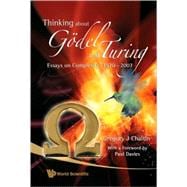
| Introductory note | p. 1 |
| On the difficulty of computations: IEEE Transactions on Information Theory, 1970 | p. 3 |
| Information-theoretic computational complexity: IEEE Transactions on Information Theory, 1974 | p. 17 |
| Randomness and mathematical proof: Scientific American, 1975 | p. 31 |
| Godel's theorem and information: International Journal of Theoretical Physics, 1982 | p. 47 |
| Randomness in arithmetic: Scientific American, 1988 | p. 65 |
| Randomness in arithmetic and the decline & fall of reductionism in pure mathematics: Bulletin of the European Association for Theoretical Computer Science, 1993 | p. 75 |
| A century of controversy over the foundations of mathematics: Calude & Paun, Finite versus Infinite, 2000 | p. 99 |
| A century of controversy over the foundations of mathematics: Complexity, 2000 | p. 129 |
| Metamathematics and the foundations of mathematics: Bulletin of the European Association for Theoretical Computer Science, 2002 | p. 153 |
| Paradoxes of randomness: Complexity, 2002 | p. 169 |
| Two philosophical applications of algorithmic information theory: Lecture Notes in Computer Science, 2003 | p. 189 |
| On the intelligibility of the universe and the notions of simplicity, complexity and irreducibility: Hogrebe & Bromand, Grenzen und Grenzuberschreitungen, 2004 | p. 201 |
| Leibniz, information, math & physics: Loffler & Weingartner, Wissen und Glauben, 2004 | p. 227 |
| Leibniz, randomness & the halting probability; Mathematics Today, 2004 | p. 241 |
| Complexity & Leibniz: Academic Internationale de Philosophie des Sciences, Tenerife, 2005 | p. 247 |
| The limits of reason: Scientific American, 2006 | p. 251 |
| How real are real numbers?: International Journal of Bifurcation and Chaos, 2006 | p. 267 |
| Epistemology as information theory: From Leibniz to [omega] Collapse: Journal of Philosophical Research and Development, 2006 | p. 281 |
| Is incompleteness a serious problem?: Lolli & Pagallo, La complessita di Godel, 2007 | p. 299 |
| Speculations on biology, information & complexity: Bulletin of the European Association for Theoretical Computer Science, 2007 | p. 303 |
| How much information can there be in a real number?: International Journal of Bifurcation and Chaos, 2007 | p. 313 |
| The halting probability [Omega]: Irreducible complexity in pure mathematics: Milan Journal of Mathematics, 2007 | p. 319 |
| The halting probability [Omega]: Concentrated creativity: Obrist, Formulas for the Twenty-First Century, 2007 | p. 333 |
| List of publications | p. 335 |
| Acknowledgements | p. 343 |
| About the author | p. 347 |
| Table of Contents provided by Ingram. All Rights Reserved. |
The New copy of this book will include any supplemental materials advertised. Please check the title of the book to determine if it should include any access cards, study guides, lab manuals, CDs, etc.
The Used, Rental and eBook copies of this book are not guaranteed to include any supplemental materials. Typically, only the book itself is included. This is true even if the title states it includes any access cards, study guides, lab manuals, CDs, etc.